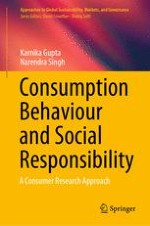2020 | OriginalPaper | Chapter
3. Conceptual Framework and Research Model
Authors : Karnika Gupta, Narendra Singh
Published in: Consumption Behaviour and Social Responsibility
Publisher: Springer Nature Singapore
Activate our intelligent search to find suitable subject content or patents.
Select sections of text to find matching patents with Artificial Intelligence. powered by
Select sections of text to find additional relevant content using AI-assisted search. powered by
